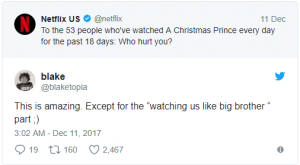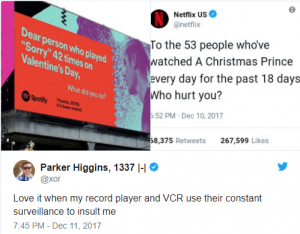06/Feb/2018
Online services such as Spotify and Netflix have been very active on social media and marketing going into the Christmas holiday season, these recent have been interesting however, the increasing role of Data Analytics to make witty references to habits of some of its user base and then using that information for marketing material is concerning.
These types of practices are often part of the terms and conditions of many notable services, but people don’t realise as the complexity and readability of these long legal texts usually causes them to be overlooked completely.
As another example, Netflix recently took to Twitter to aid their marketing efforts by producing a Christmas themed tweet,

These seem like entertaining, witty marketing efforts however in hindsight, the information is coming from the service’s everyday users, the fact that such data can be so easily picked apart and analysed is quite interesting and can be a very powerful tool.
This personalised approach to marketing has previously (And currently) been used by Spotify with ad’s such as the one below,

The company has frequently shared interesting information about viewers’ habits in the past, said Jonathan Friedland, a Netflix spokesman. He added that last week’s tweet might have inspired an intense reaction in part because “it was brought down to an individual level as opposed to a broader trend level.” But he pointed out that Netflix does not use customer data to sell ads on its platform, as Google and Facebook do, or sell it to other entities.
Statistics on Netflix viewing habits are “fascinating to people,” Mr. Friedland said. “It’s not like you’re breaching anybody’s privacy, because the core proposition here is we know you and try to put the right” films and TV series in front of you.
The question here is, In the statement Mr. Friedland states “It’s not like you’re breaching anybody’s privacy” although there seems to be reason to believe that they are, as it seems clear someone’s data was analysed to produce the adverts as seen, however much the anonymization of data can result in some effective and brilliant advertising media, questions should still be asked.
Also, the fact that the information being released is not seen as a privacy issue and is justified by the fact they do not sell advertising space such as many other online services is controversial and puzzling.

The tweet above highlights in humour the effects of the Big Data marketing efforts, as reflected this makes the ad appeal to the user on a personal level.
It’s no secret that companies, especially those born in the digital age, are amassing deep and detailed troves of information on the habits and preferences of their consumers. For streaming services, that data fuels the recommendations. But companies are also taking a bit of a risk when they turn those findings into marketing, whether through conversational social media posts or advertisements from Spotify with lines like “Take a page from the 3,445 people who streamed the ‘Boozy Brunch’ playlist on a Wednesday this year.”
A message that one person might see as clever and unexpected can just as easily be seen by another as an ominous reminder that Big Data is often lurking just around the corner.
“This gives the public a kind of view into the ways that the major content companies are gathering and using our data,” said Jeffrey Chester, head of the non-profit Centre for Digital Democracy, which advocates for consumer protection and privacy. “Behind the ease of being able to access video and audio content are very sophisticated customer surveillance and analytics applications, and there’s nothing funny about that.”
Author: Taran Ranger, CyNation
